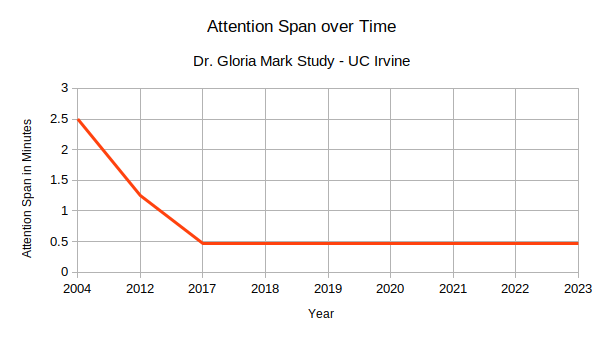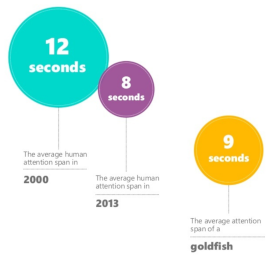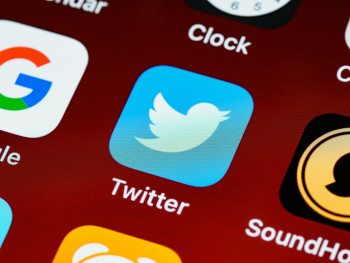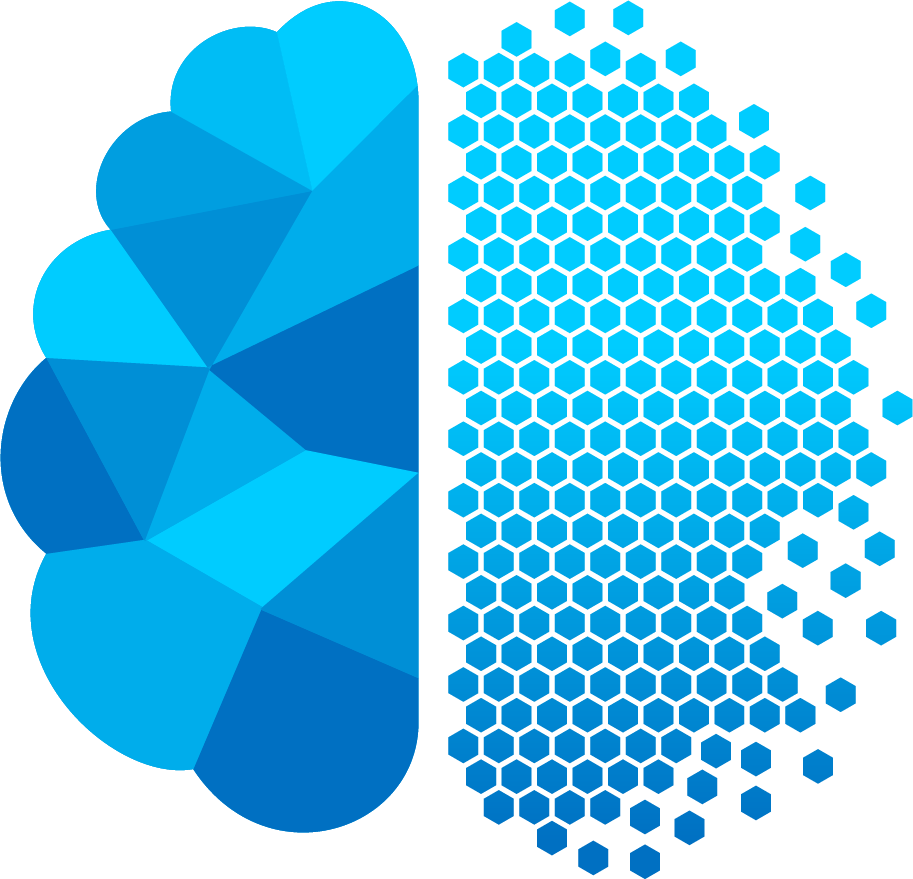Users of modern computer and communication technologies intuitively sense that these devices, while serving us, are also affecting us, possibly even changing us in subtle ways. It has been observed i, for example, that increased screen time can have various negative effects on our physical and mental health. But what about our attention span? Is it being affected? Is it really decreasing as some have suggested?
If you have the attention span for it, let’s begin by defining attention and then look at some evidence for and against the idea that attention spans are decreasing. With these in mind, we will draw our own conclusion which may surprise you.

What is Attention Span?
William James, known as the father of psychology, said “Everyone knows what attention is. It’s the taking possession by the mind in clear and vivid form of one out of what seems several simultaneously possible objects or trains of thought.” Clear enough. When we’re talking about Attention Span, we’re talking more specifically about “the length of time [one] can concentrate on some idea or activity.”ii But this concept of human attention span isn’t as simple and straightforward as one might expect.
Are Attention Spans Decreasing?
Are human attention spans decreasing over time, and if so, is it related to increased use of computers and mobile devices, and/or increased consumption of media? According to our research, the answer is both yes and no. Let’s try to make that clearer starting with the “yes” arguments.
The Yes Arguments
Dr. Gloria Mark’s Research
The American Psychological Association interviewed PhD psychologist Dr. Gloria Mark in early 2023 where she discussed the research she and her team have been conducting in this area over the last 20 years. They have found that average attention span while using a device with a screen has decreased from 2.5 minutes in 2004, to 75 seconds (1:15) in in 2012, then stabilizing at 47 seconds from 2017-2023.

The 2015 Microsoft Study
In 2015, the marketing department of Microsoft Canada conducted an online survey of 2,000 Canadians and studied the brain activity of 112 people as they carried out different tasks. The results were published in the Spring of 2015 in a report called Attention Spans.iii This report included a sensational statistic stating that average human attention span was down from 12 seconds in the year 2000, to 8 seconds in 2014, and famously noted that this was less than the average attention span of a goldfish!

This statistic would go on to be picked up and cited by Time magazine, the Telegraph, The Guardian USA Today, the New York Times, and the National Post, as well as various books and even radio shows. Later, it would be noted that this statistic was actually not even a result of Microsoft’s study, but was cited from another rather dubious source. But more on that later.
The 2019 Collective Attention Study
A new peer-reviewed study called Accelerating dynamics of collective attention was published in the Journal of Nature Communications in 2019iv. This study looked at our collective attention span (not individual) by studying Twitter data from 2013 to 2016, Google books going back 100 years, movie ticket sales going back 40 years, and citations of scientific publications from the last 25 years. They also gathered data from Google Trends (2010-2018), Reddit (2010-2015), and Wikipedia (2012-2017).v To summarize what they discovered, it appears that collectively, attention spans have been decreasing, as evidenced by the length of time Twitter hashtags stay in the top 50, for example (down from 17.5 hours in 2013 to 11.9 in 2016), and by other metrics such as the length of success of top box office movies. In short, they found “empirical evidence of ever-steeper gradients and shorter bursts of collective attention given to each cultural item.”vi

There are some other interesting attention span statistics onlinevii, but as they all fall in to either the “yes they are decreasing,” or the “no, they’re not” camp, let’s suffice ourselves with these three for now and move on to a couple of “No” arguments.
The No Arguments
The BBC Article: Busting the Attention Span Myth
Simon Maybin of BBC World Service published an article in March of 2017 questioning the prevailing narrative of decreasing attention spans.viii First, he pointed out that the ever-so- popular Microsoft 8 second statistic, said to be less than a goldfish, was actually not a result of their own study at all, but was cited within their study as coming from a website called Statistic Brain. Statistic Brain was found to be sourcing that statistic from a number of other sources. So he followed up on those only to discover that none of them could find any record of any research that supported it!
He also spoke with a number of experts who confirmed his skepticism about the prevailing narrative in various ways. One of the experts he spoke with is Felicity Huntingford, professor emeritus of functional ecology at the University of Glasgow, who told him that Goldfish do not in fact have short attention spans, but “can perform all the kinds of learning that have been described for mammals and birds..because they have a memory and because they can learn.”ix Another psychology lecturerx he interviewed said that the idea that attention spans are getting shorter is “just plain wrong…simply because” she studies drivers and crime witnesses, for example, and says “[human attention] is very much task-dependent. How much attention we apply to a task will vary depending on what the task demand is.”

Forbes 2023 article: Humans Have Massive Capacity For Sustained Attention, And Storytelling Unlocks It
In January of 2023, Shane Snow wrote an article for Forbes Magazine which also questioned the prevailing consensus.xi He investigated the 8-second number from Statistic Brain as well, and discovered that the website itself was nothing more than “an SEO website masquerading as an academic institution.” Website representatives cited two sources for the number, one which was “an analytics report about 25 people who quickly left websites they didn’t like…in 2008.” The other source told them that what Statistics Brain had posted was false. He concluded that “the ‘news’ that humans have goldfish-level attention spans was fake.”
But more importantly, he provided two credible sources that tell a completely different story: Netflix, and a report by Deloitte. Netflix is known to track everything their users do, and they report that “people pay attention to good movies and series for a lot longer than 8 seconds.” Similarly, Deloitte’s report demonstrates that “73% of people had binge-watched a show, meaning they’d watched 5 hours of content in a single setting.” Snow goes on to describe, based on other credible research he provides, that storytelling actually induces a deep, sustained type of attention called immersion in humans, which can last much longer than the popular statistics would indicate.
So What is the Truth?
We said at the beginning that the answer to the question in this article’s title is “yes and no.” Here’s why. Clearly, credible metrics such as the Mark’s study and Collective Attention study show that human attention spans are decreasing on average over time, and this decrease is generally correlated with the increased use of information technology and its devices. But it has also been demonstrated that humans continue to have massive capacity for sustained attention when engaged with content that is interesting or challenging such as stories, or when engaged with a task that simply demands more attention.
If both of these are true, then how do we explain the shorter attention spans that have been clearly documented? It seems clear to this writer that the answer is found in an observation made by researchers in the 2019 Collective Attention Study. They noted that “The one parameter in the model that was key in replicating the empirical findings was the input rate – the abundance of information. The world has become increasingly well connected in the past decades. This means that content is increasing in volume, which exhausts our attention and our urge for ‘newness’ causes us to collectively switch between topics more rapidly.”xii
Conclusion
Their conclusion is that the apparent decrease in attention span over time is a direct result of the increasing amount of data (news and other media) that modern man is now compelled to review and evaluate on a daily basis. In other words, because there’s more information to consume, we just simply have less time per item to review it. In this view, it’s not that man’s capacity to pay attention is being reduced, but rather that our limited bandwidth is simply being saturated.
Stay tuned for the next article in this two-part series which will focus on stewardship of our attention span by seeking to answer the question: What Can We Do About It?
Visit Digital Dayz blog page for more thought-provoking articles about our digital lives!
ihttps://www.digital-dayz.com/2024/04/06/screen-time-management-for-mobile-devices/
iiWordNet 3.0 2006 from Linux MATE desktop Dictionary app version 1.26.
iiiMicrosoft Canada. Attention Spans. No longer available online. Copy found at https://sherpapg.com/wp-content/uploads/2017/12/MAS.pdf. Spring 2015.
ivLorenz-Spreen, P., Mønsted, B.M., Hövel, P. et al. Accelerating dynamics of collective attention. Natural Communications 10, 1759 (2019). https://doi.org/10.1038/s41467-019-09311-w
vSee Abundance of information narrows our collective attention span. EurekAlert!. News Release. https://www.eurekalert.org/news-releases/490177. April 2019.
viIbid.
viiSuch as the Wellbrook Recovery Report. Average Human Attention Span Statistics [2024]. https://www.wellbrookrecovery.com/post/average-attention-span#:~:text=In%20adulthood%2C%20the%20average%20attention,to%20sustain%20attention%20may%20decline. January 2024.
viiiMaybin, Simon. Busting the Attention Span Myth. BBC News. https://www.bbc.com/news/health-38896790. March 2017.
ixIbid.
xDr. Gemma Briggs, psychology lecturer at Open University.
xiSnow, Shane. Forbes. Science Shows: Humans Have Massive Capacity For Sustained Attention, And Storytelling Unlocks It. https://www.forbes.com/sites/shanesnow/2023/01/16/science-shows-humans-have-massive-capacity-for-sustained-attention-and-storytelling-unlocks-it/. January 2023.
xiiSee note v for reference.



